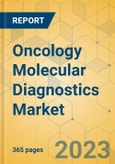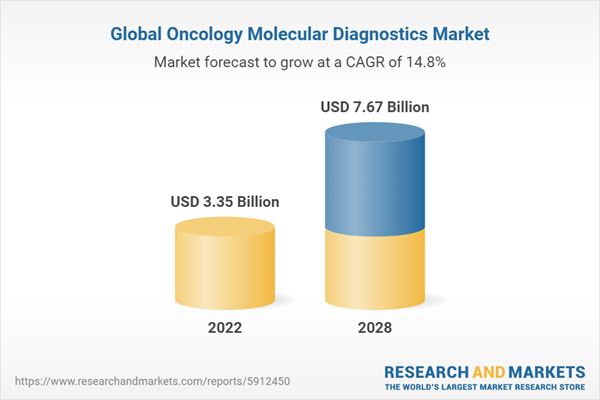Speak directly to the analyst to clarify any post sales queries you may have.
MARKET TRENDS & DRIVERS
Growing Significance of Companion Diagnostics for Oncology Drug Development
Companion diagnostics have become paramount in oncology drug development, aligning treatment decisions with patient-specific molecular profiles. These tests enable identifying individuals likely to respond to targeted therapies while excluding non-responders, enhancing treatment efficacy. As pharmaceutical companies increasingly integrate companion diagnostics into their drug development pipelines, precision medicine becomes a cornerstone of oncology, offering more effective and personalized treatment options for cancer patients. This growing significance of companion diagnostics is revolutionizing how oncology drugs are developed and administered, ultimately improving patient outcomes.Increasing Partnerships & Collaboration for the Development of Oncology Molecular Diagnostics
Increasingly, partnerships and collaborations are shaping the landscape of oncology molecular diagnostics. Diagnostic companies, pharmaceutical firms, and research institutions are joining forces to develop cutting-edge molecular tests and companion diagnostics. These collaborations aim to accelerate the translation of genomic discoveries into clinical applications, enhancing the precision of cancer diagnosis and treatment and ultimately improving patient outcomes in the rapidly evolving field of oncology molecular diagnostics.Emerging Immuno-oncology Based Cancer Treatments
Emerging immuno-oncology-based cancer treatments represent a prominent global oncology molecular diagnostics market trend. These therapies harness the body's immune system to combat cancer cells, emphasizing precision medicine. Molecular diagnostics are pivotal in identifying biomarkers for patient selection, monitoring treatment response, and developing innovative immuno-oncology therapies. This trend promises to revolutionize cancer care, offering more effective and personalized treatment options.Rising Global Cancer Prevalence
The rising global cancer prevalence is a significant driver of the market. As cancer cases increase worldwide due to factors such as aging populations and lifestyle changes, there is a growing need for accurate and early cancer detection. Oncology molecular diagnostics play a crucial role in diagnosing and monitoring cancer, guiding treatment decisions, and ultimately improving patient outcomes in the face of this escalating global health challenge.Transformation of Precision Cancer Care
The transformation of precision cancer care, driven by advances in molecular diagnostics, is a major catalyst for the growth of the oncology molecular diagnostics market. With a focus on tailoring treatments to individual genetic profiles, this paradigm shift enhances treatment efficacy, reduces side effects, and drives the demand for advanced diagnostic technologies in oncology. As oncologists increasingly rely on molecular insights to make informed treatment decisions, the market continues to expand to meet the growing need for personalized cancer care.New Product Launches
New product launches are pivotal in driving the oncology molecular diagnostics market. These innovations continually expand the repertoire of diagnostic tools and solutions, enhancing molecular tests' accuracy, sensitivity, and clinical utility. By introducing novel assays, platforms, and technologies, new product launches empower healthcare providers to make more informed treatment decisions and improve patient outcomes in the ever-evolving field of oncology molecular diagnostics.Technological Advancements in Molecular Diagnostics
Technological advancements in molecular diagnostics, including NGS, PCR techniques, and high-throughput platforms, are driving the oncology molecular diagnostics market. These innovations enable more accurate and comprehensive profiling of genetic and molecular alterations in cancer, facilitating personalized treatment strategies and early detection, ultimately improving patient outcomes and fueling market growth.SEGMENTATION INSIGHTS
INSIGHTS BY PRODUCT TYPE
The global oncology molecular diagnostics market by product type is segmented into kits & reagents and instruments & platforms. The kits & reagents accounted for the market share in the product type segment in 2022 and is expected to grow at the highest CAGR during the forecast period. The kits & reagents are essential components of molecular diagnostics. They include DNA/RNA extraction kits, PCR reagents, nucleotide probes, and sequencing reagents. These products are vital for preparing and analyzing biological samples for cancer-specific biomarkers. Further, the instruments & platform category comprises various laboratory equipment and analytical instruments for molecular diagnostics, including PCR machines, NGS platforms, microarray scanners, and automated liquid handling systems. These instruments enable the processing and analysis of genetic and molecular data. Molecular diagnostic software is crucial in data analysis, interpretation, and reporting. It includes bioinformatics tools, data management software, and specialized algorithms for genomic analysis.Segmentation by Product Type
- Kits & Reagents
- Instruments & Platforms
INSIGHTS BY CANCER TYPE
The global oncology molecular diagnostics market by cancer type is segmented into breast, colorectal, lung, and blood. In 2022, breast cancer dominated the global market share. Molecular diagnostics are crucial in breast cancer prognosis and treatment selection, identifying hormone receptor status (ER, PR) and HER2/neu amplification. Further, the colorectal cancer segment is expected to witness the highest segmental CAGR of over 15% during the forecast period. Colorectal cancer is a significant global health concern, accounting for millions of cancer-related deaths annually. Early detection and precise treatment are critical factors in improving patient outcomes.Segmentation by Cancer Type
- Breast Cancer
- Colorectal Cancer
- Lung Cancer
- Blood Cancer
- Others
INSIGHTS BY TECHNOLOGY
The polymerase chain reaction (PCR) technology segment held the most prominent share of the global oncology molecular diagnostics market in 2022. PCR is a widely used technology that amplifies specific DNA sequences, allowing for the detection of genetic mutations and variations associated with various cancer types. It is known for its high sensitivity and specificity in identifying genetic abnormalities. The sequencing segment is expected to grow at the highest CAGR in the technology during the forecast period. The field of oncology has witnessed a transformative shift in how cancer is diagnosed, characterized, and treated, largely owing to advancements in molecular diagnostics. Sequencing technology has emerged as a powerful tool among the various techniques driving progress in this domain.Segmentation by Technology
- Polymerase Chain Reaction (PCR)
- Hybridization
- Isothermal Nucleic Acid Amplification Technology (INAAT)
- Sequencing
- Other
INSIGHTS BY END-USER
The diagnostic laboratory end-user holds a dominant share of the global oncology molecular diagnostics market and is expected to witness the highest segmental CAGR during the forecast period. Diagnostic facilities perform molecular tests, including DNA and RNA analysis, to detect genetic mutations, biomarkers, and other cancer-related molecular alterations. Furthermore, hospital settings are significant consumers of molecular diagnostics in oncology. Oncology molecular diagnostics, encompassing various technologies such as DNA sequencing, PCR, and microarrays, have transformed cancer diagnosis, prognosis, and treatment decision-making. Hospitals are often the primary sites for diagnosing cancer. Oncology molecular diagnostics provide hospitals with precise tools to identify the presence of cancer, classify its type, and determine its molecular characteristics.Segmentation by End-user
- Diagnostic Laboratories
- Hospitals
- Other
GEOGRAPHICAL ANALYSIS
North America accounted for the highest global oncology molecular diagnostics market share in 2022, accounting for over 46%. The region boasts a robust healthcare infrastructure, including specialized cancer centers and research institutions. This supports the development, validation, and adoption of molecular diagnostics. The area is at the forefront of technology and innovation, driving the rapid growth of molecular diagnostic assays and platforms during the forecast. A significant number of clinical trials in oncology are conducted in North America, fostering the integration of molecular diagnostics into treatment decision-making. Well-defined regulatory processes, such as FDA approvals in the U.S., provide a clear pathway for market entry, boosting investor confidence.Segmentation by Geography
- North America
- The U.S.
- Canada
- Europe
- Germany
- France
- The U.K.
- Italy
- Spain
- APAC
- China
- Japan
- India
- South Korea
- Australia
- Latin America
- Brazil
- Mexico
- Argentina
- Middle East & Africa
- Turkey
- Saudi Arabia
- South Africa
COMPETITIVE LANDSCAPE
The global oncology molecular diagnostics market is fiercely competitive, driven by an ever-increasing demand for accurate cancer diagnosis and personalized treatment. The key players in the market, such as Abbott, Agilent Technologies, Danaher, F. Hoffmann-La Roche, QIAGEN, and Siemens Healthineers, among other prominent vendors, are driving the growth of oncology molecular diagnostics. Several vital strategies shape competition in the global oncology molecular diagnostics market. For instance, companies invest heavily in research and development to create more accurate and cost-effective diagnostic assays and technologies. This includes advancements in NGS, liquid biopsies, and companion diagnostics.Key Company Profiles
- Abbott
- Agilent Technologies
- Danaher
- F.Hoffmann La-Roche
- QIAGEN
- Siemens Healthineers
Other Prominent Vendors
- BD
- BillionToOne
- Biocartis
- Biodesix
- bioMérieux
- Bio-Rad Laboratories
- Caris Life Sciences
- Epigenomics
- Exact Sciences
- Guardant Health
- Hologic
- Illumina
- Laboratory Corporation of America
- Lepu Medical Technology (Beijing)
- Myriad Genetics
- Sysmex Corporation
- Thermo Fisher Scientific
KEY QUESTIONS ANSWERED:
1. How big is the oncology molecular diagnostics market?2. What is the growth rate of the global oncology molecular diagnostics market?
3. Which region dominates the global oncology molecular diagnostics market share?
4. What are the significant trends in the oncology molecular diagnostics market?
5. Who are the key players in the global oncology molecular diagnostics market?
Table of Contents
Companies Mentioned
- Abbott
- Agilent Technologies
- Danaher
- F.Hoffmann La-Roche
- QIAGEN
- Siemens Healthineers
- BD
- BillionToOne
- Biocartis
- Biodesix
- bioMérieux
- Bio-Rad Laboratories
- Caris Life Sciences
- Epigenomics
- Exact Sciences
- Guardant Health
- Hologic
- Illumina
- Laboratory Corporation of America
- Lepu Medical Technology (Beijing)
- Myriad Genetics
- Sysmex Corporation
- Thermo Fisher Scientific
Methodology
Our research comprises a mix of primary and secondary research. The secondary research sources that are typically referred to include, but are not limited to, company websites, annual reports, financial reports, company pipeline charts, broker reports, investor presentations and SEC filings, journals and conferences, internal proprietary databases, news articles, press releases, and webcasts specific to the companies operating in any given market.
Primary research involves email interactions with the industry participants across major geographies. The participants who typically take part in such a process include, but are not limited to, CEOs, VPs, business development managers, market intelligence managers, and national sales managers. We primarily rely on internal research work and internal databases that we have populated over the years. We cross-verify our secondary research findings with the primary respondents participating in the study.

LOADING...
Table Information
| Report Attribute | Details |
|---|---|
| No. of Pages | 365 |
| Published | December 2023 |
| Forecast Period | 2022 - 2028 |
| Estimated Market Value ( USD | $ 3.35 Billion |
| Forecasted Market Value ( USD | $ 7.67 Billion |
| Compound Annual Growth Rate | 14.8% |
| Regions Covered | Global |
| No. of Companies Mentioned | 23 |









